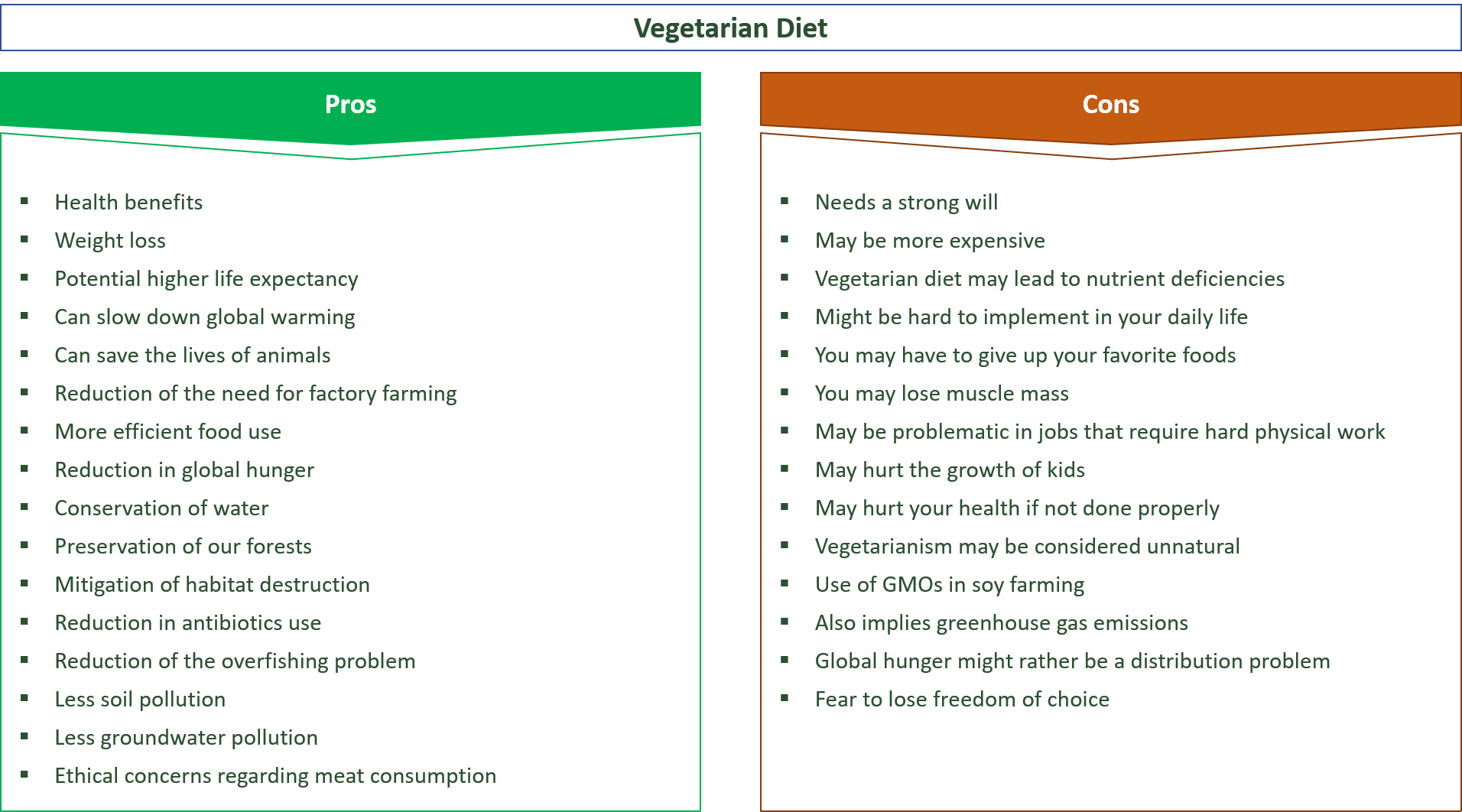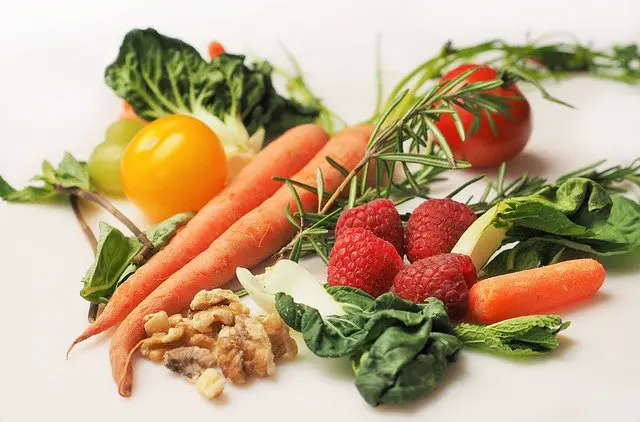“I’m not strictly vegetarian, but meat doesn’t play a big part in my diet.”
Katie Holmes, Actress
Advantages & Disadvantages of Vegetarian Diets

Vegetarianism has become quite popular over the past decade.
People become more conscious about our environmental problems and the awareness regarding our nutrition and diets increased significantly.
Even though a vegetarian diet has many advantages, it also implies some downsides.
In this article, the pros and cons of a vegetarian diet are examined in detail.
Audio Lesson
Contents
Advantages of a Vegetarian Diet
- Health benefits
- Weight loss
- Potential higher life expectancy
- Can slow down global warming
- Can save the lives of animals
- Reduction of the need for factory farming
- More efficient food use
- Reduction in global hunger
- Conservation of water
- Preservation of our forests
- Mitigation of habitat destruction
- Reduction in antibiotics use
- Reduction of the overfishing problem
- Less soil pollution
- Less groundwater pollution
- Ethical concerns regarding meat consumption
Health benefits
One major advantage of vegetarian diets is that it can be quite healthy.
For instance, many people, especially in our Western world, consume far too much meat, which leads to all kinds of health issues in the long run.
Thus, those health issues can be avoided by switching from a meat-based diet to a vegetarian lifestyle.
However, those health benefits can only manifest if people inform themselves about what it means to become vegetarian.
Some vegetarians also suffer from health issues due to a lack of certain nutrients and vitamins.
Therefore, if you consider becoming vegetarian, inform yourself first in order to really make your diet healthier and not worse.
Weight loss
Since plant-based diets often also imply the consumption of fewer calories, people tend to lose weight by switching from a meat-based to a vegetarian diet.
Especially in our Western world where overweight and obesity are big problems, weight loss might be quite beneficial in order to increase our overall health levels and to lower the enormous public costs that are associated with diseases like obesity.
However, note that not all vegetarians are slim and fit.
It also depends on their lifestyle, exercising and other factors, not only on changes in nutrition.
Potential higher life expectancy
Vegetarianism is also often associated with a higher average life expectancy.
However, it is questionable if this is really true.
Even though people living on a vegetarian diet tend to live longer, there might be additional factors apart from their diet that vastly affect life expectancy.
For instance, people who engage in vegetarian diets may also be better educated and more aware of their health.
Thus, those people are also more likely to work out on a regular basis and to take additional measures to stay healthy.
Therefore, the higher life expectancy might be correlated, but might not actually be solely caused by a vegetarian diet.
Can slow down global warming
In our Western world, we consume excessive levels of meat on a daily basis.
These high levels of meat consumption also contribute to climate change.
Through the production of meat, large amounts of greenhouse gases are emitted into the air.
Through the switch from a meat-based to a vegetarian diet, the level of greenhouse gas emissions could be significantly lowered and global warming and its related adverse environmental effects could be slowed down to a certain extent.
Can save the lives of animals
A meat-based diet also implies the need to take the lives of millions or even billions of animals each year.
Many people feel some kind of responsibility to lower or even to fully avoid their meat consumption in order to save the lives of animals.
Some people also claim that meat consumption should be abandoned since there are plenty of diet alternatives and we as humans might not have to use the meat from animals anymore to survive.
Thus, many people also think that saving the lives of animals should be prioritized over our enjoyment regarding meat consumption.
Reduction of the need for factory farming
In order to meet the excessive demand for meat on a global scale, factory farming has become an effective and cheap tool to produce large amounts of meat in a quite short period of time.
However, there are many problems with factory farming. Animals are usually treated quite poorly and may suffer from plenty of health issues since they are often barely able to move.
Thus, factory farming can be considered to be quite problematic from an animal rights perspective.
Through the switch from a meat-based to a vegetarian diet, the overall meat demand would be lowered and so would be the need for factory farming.
More efficient food use
Meat consumption can also be regarded as quite an inefficient food use.
For instance, for the production of one calory of meat, multiple calories of plant material have to be used.
This implies that we could feed many more people by switching from a meat-centered to a vegetarian diet instead.
Thus, vegetarianism can also be considered to be more efficient in terms of calory use compared to a meat-based diet.
Reduction in global hunger
Since an increase in vegetarianism would allow us to feed more people, this would also imply that the number of people who currently suffer from global hunger and starvation could be significantly decreased.
Thus, everyone of us could make his or her contribution to ensure the livelihood of people around the world through the reduction of meat consumption or even better by an entire switch to a plant-based diet.
Conservation of water
Since the production of meat also implies the use of huge amounts of water, switching to a vegetarian diet would also conserve plenty of water.
Water will become a quite scare resource in the future due to global warming and the conservation of water will therefore become a crucial topic in a few years.
There might be even fights for water, especially in poor regions of our planet.
Thus, vegetarianism might also conserve water and might ensure the livelihood of many people around the globe who would otherwise suffer from a serious shortage of drinking water.
Preservation of our forests
In order to supply our global population with plenty of meat, large areas of land have to be used.
However, our world population is growing and so is the demand for meat.
In order to be able to supply enough meat in the future, chances are that large forest areas have to be cut or burned down in order to get more space for farming.
Hence, our excessive meat consumption may also contribute to deforestation and the implied environmental issues.
By switching to a vegetarian diet, this problem could be mitigated to a certain extent.
Mitigation of habitat destruction
Deforestation also implies the destruction of habitats of a huge variety of animals and plants.
Thus, in order to avoid deforestation and to preserve the natural living space of our species, we should refrain from excessive meat production and consume more plant-based products instead.
Reduction in antibiotics use
In the industrial meat production industry, large amounts of antibiotics are used in order to keep animals healthy.
However, the excessive use of antibiotics is quite problematic since it could lead to antibiotic resistance for us humans.
Since humanity relies on antibiotics for the treatment of several diseases, those antibiotics might no longer work anymore in the future and many people might die due to that.
Thus, in order to fight this problem, switching to a vegetarian diet might be a valid solution since far less or even no antibiotics have to be used in the growing process at all.
Reduction of the overfishing problem
Not only factory farming can be seen as quite problematic, also overfishing has become a quite big problem over the past decades.
Many fish species have become endangered in the past and may even become extinct if we do not preserve them properly.
In order to preserve our fish stocks, we all can make a positive contribution through the reduction in fish consumption.
This is also implied by a vegetarian diet since all kinds of animals are excluded.
Thus, by switching to vegetarianism, you can also contribute to reduce the overfishing problem.
Less soil pollution
Our excessive meat production also implies significant soil pollution.
In order to supply enough feed, excessive amounts of fertilizers are used.
However, overuse of fertilizers also implies the contamination of the soil with harmful substances.
In the long run, this soil may become less fertile and it may no longer be suitable for agricultural purposes anymore.
Thus, in order to avoid factory farming and the related soil pollution, switching to a vegetarian diet may be a suitable measure since less meat would have to be produced.
Less groundwater pollution
Soil pollution due to factory farming also often implies groundwater pollution.
Harmful substances in the soil are sooner or later washed into our groundwater.
Since water will become a quite scarce and valuable resource in the future, it is crucial that we protect our groundwater reserves.
By reducing our meat consumption and switching to a vegetarian diet, we could also mitigate the problem of groundwater pollution to a certain extent.
Ethical concerns regarding meat consumption
Many people also feel the need to refrain from meat consumption due to the poor treatment of animals in factory farming and also since they do not want to be responsible for the death of animals.
Therefore, many vegetarians are also convinced that it is not justifiable from an ethical perspective to consume meat since there are many different diet alternatives.
Thus, also from an ethical standpoint, switching to vegetarianism may be the way to go in the future.

Disadvantages of a Vegetarian Diet
- Needs a strong will
- May be more expensive
- Vegetarian diet may lead to nutrient deficiencies
- Might be hard to implement in your daily life
- You may have to give up your favorite foods
- You may lose muscle mass
- May be problematic in jobs that require hard physical work
- May hurt the growth of kids
- May hurt your health if not done properly
- Vegetarianism may be considered unnatural
- Use of GMOs in soy farming
- Also implies greenhouse gas emissions
- Global hunger might rather be a distribution problem
- Fear to lose freedom of choice
Needs a strong will
Vegetarianism has many important advantages.
However, there are also some downsides related to it.
For instance, it will be quite hard for many people to switch from a meat-centered diet to a vegetarian one.
Some people really love eating meat and can not imagine to stop eating meat at all.
Thus, it will need a quite strong will to stay persistent and to refrain from meat consumption.
This is especially true since you will see tasty steaks, burgers and all kinds of delicious meat all the time and it will be quite tempting to quit vegetarianism in the long run.
May be more expensive
Since in many countries, meat is quite cheap due to factory farming, a vegetarian diet might even be more expensive compared to a meat-based diet.
Consequently, depending on the amounts of veggies and fruits you need to feel saturated, a vegetarian diet may cost you more money and you might have to cut your expenses for other things due to that.
Vegetarian diet may lead to nutrient deficiencies
Another issue of a vegetarian diet is that it can lead to serious nutrient and vitamin deficiencies in the long run.
For instance, many vegetarians suffer from a lack of vitamin B12.
Thus, in order to supply your body with these vital vitamins and other components, vegetarians may need to rely on food supplements.
However, food supplements can also be harmful to human health if they are not applied in a correct manner.
Therefore, vegetarians might also suffer from some kind of health issues related to a lack of nutrients and vitamins.
Might be hard to implement in your daily life
It might also not be easy to implement a vegetarian lifestyle.
Even though many vegetarian restaurants opened over the past years in many big cities, there are still some areas on our planet where this kind of lifestyle is not popular yet and especially in those regions, you might have a quite hard time and it might take plenty of effort to practice a vegetarian diet.
Thus, living a vegetarian lifestyle may also require more effort compared to relying on a meat-based diet.
You may have to give up your favorite foods
Let’s be honest. Especially for men, most of their favorite foods are made out of meat.
Men like to barbecue and to eat tasty steaks, burgers, sausages and all other kinds of meat.
Thus, especially for men and also women who love to eat good meat, it would be quite hard to give up all those delicious dishes.
I know many people who would never be willing to give up the pleasure of eating those foods.
Therefore, it might be quite hard to convince part of our society to switch to a vegetarian diet since it would simply be too much pain for many people.
You may lose muscle mass
Since meat contains plenty of protein, switching from a meat to a vegetarian diet might also imply a loss in muscle mass.
Even though there are some products that are made in order to meet this problem, vegetarians will tend to have more difficulties to sustain their muscles.
Thus, especially if you are quite active in the bodybuilding industry, you might have a quite hard time to avoid meat since it will be a major component of your diet in order to grow your muscles.
May be problematic in jobs that require hard physical work
Switching to a vegetarian diet may also be quite hard for people who have to work in physically exhausting jobs.
For instance, working in construction involves plenty of physical work and construction workers need large amounts of energy from their food in order to be able to stay fit.
However, a purely vegetarian diet might not be sufficient to provide this kind of energy.
There is a reason why people in physically demanding jobs often even eat meat for breakfast.
Thus, if you work in one of those physically demanding professions, chances are that you might have difficulties getting enough energy from a vegetarian diet.
May hurt the growth of kids
Through different media channels, we also frequently hear from parents who wanted to feed their kids solely on a vegetarian or even on a vegan diet.
Many of those kids will suffer from growth problems and may also suffer from serious consequential damage in the long run.
Therefore, especially for children, a vegetarian diet might rather harm than do any good and parents should really be careful regarding vegetarian or even vegan diets for their children.
May hurt your health if not done properly
Since vegetarians have it harder to get sufficient nutrients, they may also be more likely to suffer from health issues caused by a lack of vitamins and minerals.
Thus, before switching to a vegetarian diet, it is crucial that you inform yourself about the consequences and how you can get enough nutrients to stay healthy even without eating any meat.
If you do not inform yourself, chances are that you will suffer from serious health issues in the long run due to your vegetarian diet.
Vegetarianism may be considered unnatural
Since our ancestors ate vegetables but also relied on meat as a major food source, it may seem kind of unnatural to many people to give up eating meat since our ancestors have consumed meat for millions of years and our genetics developed according to that.
Hence, in order to keep our body healthy, many people claim that meat should be an essential part of every diet since our body adapted to meat consumption for a quite long period of time.
Use of GMOs in soy farming
Vegetarians often rely on soil products as a substitute for meat.
However, soy is often produced through the use of genetically modified plants.
There are many critics out there which claim that genetic engineering can be quite harmful to humanity and that it might also affect our health in an adverse manner.
Thus, since vegetarians rely on many products that are made out of genetically modified plants, they may be at greater risk to suffer from potential adverse health consequences.
Also implies greenhouse gas emissions
Even though the production of vegetables and fruits implies less greenhouse gas emissions, vegetarian diets are not entirely green.
Also for the production of crops, large machines have to be used which emit significant amounts of greenhouse gases into our atmosphere.
Global hunger might rather be a distribution problem
Even though we could feed more people by switching from a meat-based to a vegetarian diet, this does not automatically mean that we actually will feed more people on a global scale.
Global hunger is not only a phenomenon of a lack of food, it is rather caused by distribution problems.
For instance, we would currently be able to feed our entire world population.
However, millions of people die each year from starvation.
Thus, in order to fight poverty and starvation, it is crucial to fight the structural political problems and switching to a vegetarian diet would not solve those issues.
Fear to lose freedom of choice
Many people are also quite critical when it comes to restrictions on their diet.
Some people fear that they will be confined regarding their diet in the future.
Thus, especially if you live in those regions, you might have a quite hard time and might be even bullied if you practice a vegetarian diet.

Top 10 Vegetarianism Pros & Cons – Summary List
| Vegetarianism Pros | Vegetarianism Cons |
|---|---|
| Positive health effects | May need a strong motivation |
| Less factory farming needed | Vegetarian diets may be expensive |
| Efficient food use | Hard to implement in daily life |
| Mitigation of global hunger | Not respected in some regions yet |
| Slow down global warming | Use of genetic engineering |
| Water conservation | May be considered to be unnatural |
| Possible higher life expectancy | May hurt your kids |
| Reduction of overfishing | Nutrient deficiencies |
| Less soil pollution | Less energy |
| Reduction of groundwater pollution | Problematic in some jobs |
Conclusion
The vegetarian diet has become extremely popular over the past decade.
Hundreds of millions of people around the world rely on it.
Although vegetarianism has many important advantages, it might not be the right way to go for some people since it also implies serious issues.
You have to decide for yourself whether you want to switch from a meat-based to a vegetarian diet or not, depending on your individual preferences and by evaluating all the pros and cons carefully in order to be able to make a profound decision.
Sources
https://en.wikipedia.org/wiki/Vegetarianism
https://www.healthline.com/nutrition/vegetarian-diet-plan

About the author
My name is Andreas and my mission is to educate people of all ages about our environmental problems and how everyone can make a contribution to mitigate these issues.
As I went to university and got my Master’s degree in Economics, I did plenty of research in the field of Development Economics.
After finishing university, I traveled around the world. From this time on, I wanted to make a contribution to ensure a livable future for the next generations in every part of our beautiful planet.
Wanna make a contribution to save our environment? Share it!